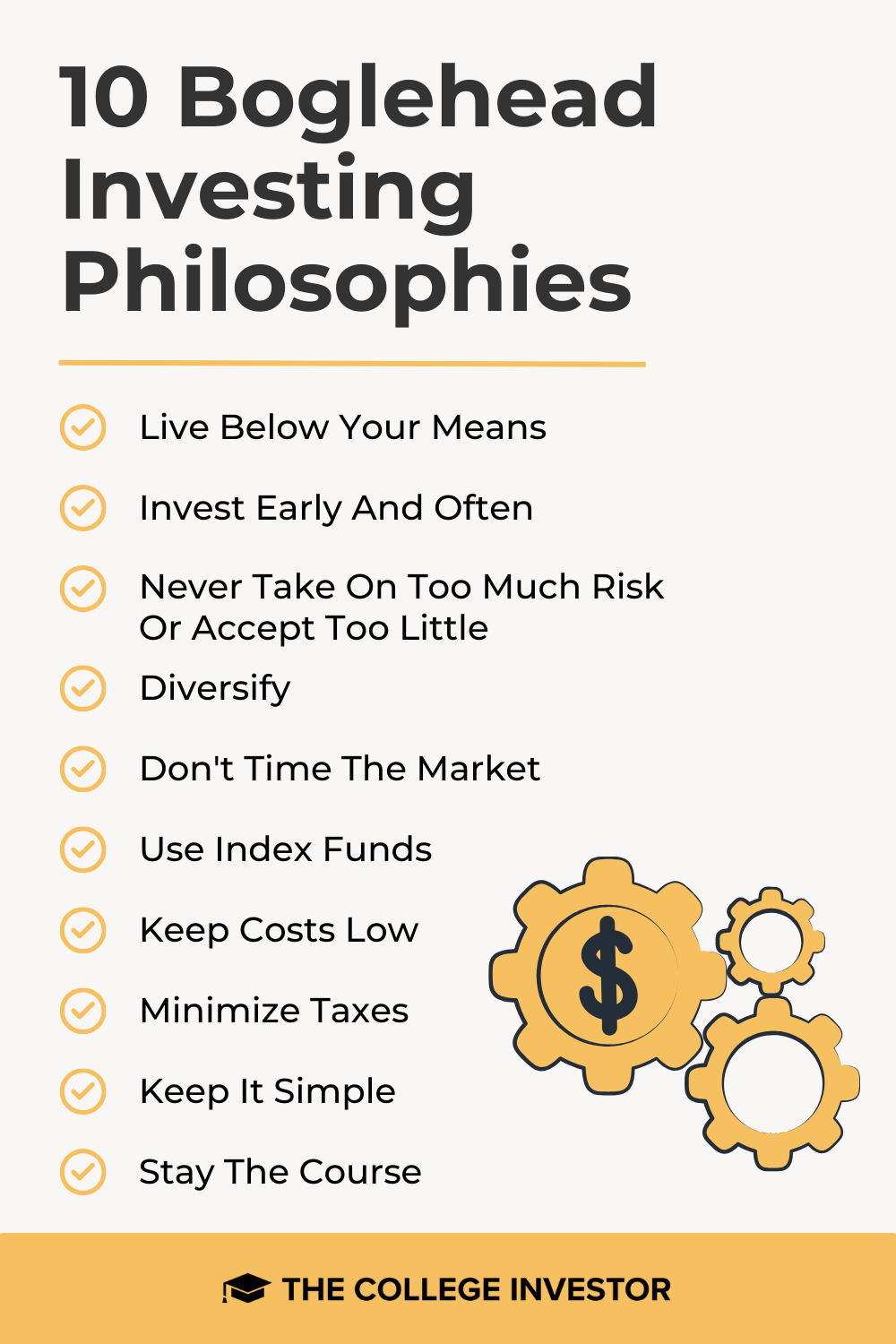
If you've searched for anything investing related, chances are you've stumbled across the Bogleheads at some point in time.
The Bogleheads Investing Forum is one of the most active, and honestly one of the best, resources when it comes to investing Q&A.
While researching my article on The Best Investors of All Time, the term Bogleheads kept coming up when I was researching Jack Bogle. For a quick refresher, Jack Bogle is the founder of Vanguard, and a champion of low-cost simple investing philosophies.
However, his basic principles have been extolled upon by several other mainstream finance authors, as well as thousands of other self-proclaimed Bogleheads. If you subscribe to his ideas of low cost index investing, or simply browse their forums, you can probably call yourself a Boglehead too.
Here's a little more about this awesome group of investors and personal finance lovers.
What Do Bogleheads Follow?
Bogleheads follow several simple investing philosophies:
1. Live Below Your Means
This is a simple strategy - spend less than you earn. Live below what you need. Save the rest. Frugality is important, but so is earning more.
2. Invest Early And Often
This is one of the main reasons why I started this site. I wanted to encourage young adults and college students to start investing. The earlier you start, the better you'll be financially.
3. Never Take On Too Much Risk, Or Accept Too Little
Investing is a game of risk - but you don't want to go crazy. You can lose money investing. In fact, many people have gone broke investing. But that's rare, and it's near impossible to lose all your money investing if you follow simple advice.
4. Diversify
It's important to never keep all your eggs in one basket. Look at the people who had all their investments with their company stock, and then their company goes bankrupt. Investing in low cost index funds gives you diversity in your portfolio, especially as you mix up stocks, bonds, and other asset classes.
5. Don't Time The Market
Time in the market is better than timing the market. You never will know when the top or bottom is, all you can do is invest for the long term.
6. Use Index Funds
Index funds are fantastic tools to diversify across the stocks. Heck, you can buy the total stock market in one index fund! When it comes to diversification at low cost, there's no better way to do it.
7. Keep Costs Low
Fees are going to be the number one detriment to long term investing success. Keep cost low. Invest in low-cost mutual funds, and be wary of advisor fees. Read this scary story if you dare.
8. Minimize Taxes
Taxes are the enemy - we all hate taxes. Make sure you're taking advantage of tax-deferred investment tools like a 401k or IRA to the max. If you're self employed, you have the solo 401k at your disposal that can really allow you to save.
9. Keep It Simple
Simplicity is important. The more complex you make things, the harder it is to manage. Investing can be simple. Pick a few funds, keep your accounts together, and watch your money grow.
10. Stay The Course
The stock market goes up and down. In fact, as of writing this, it's near all time highs. It might crash. But you need to stay the course and keep investing for the long run. Buy low, sell high - don't fall for the panic and do it backwards.

How to be a Boglehead
Bogleheads invest and keep it simple by buying mutual funds or ETFs that try to mimic the entire market. Or, to build a proper asset allocation for their own individual needs, they may buy a stock mutual fund and bond mutual fund to be diversified in both asset classes. When buying these funds, they pay special attention to fees, and only invest in funds with low fees and expenses.
Taxes are also a huge consideration. To maximize tax efficiency, investment vehicles like 401ks and IRAs are the preferred mediums.
Finally, they stay the course - the stock market goes down, they keep investing. The stock market goes up, they keep investing.
Do You Have To Invest At Vanguard?
This is a controversial topic. Since Jack Bogle was the founder of Vanguard, many Bogleheads swear by investing at Vanguard.
And Vanguard, as a fund company, typically has some of the best mutual funds and ETFs to invest in. However, over the last few years, competition has been fierce amongst the best online investment brokers. And there has been a so-called "race to the bottom" in low cost investing, with some companies offering truly free investing.
As such, while Vanguard is still highly regarded as a great place to invest, there are alternatives that may work better for some people. These include:
Fidelity - Fidelity is consistently a top pick to invest at, as they have a large selection of low cost (and no cost) funds to invest in. Check out our Fidelity review here.
M1 Finance - M1 Finance is a new-comer, but they offer commission free investing, with the ability to invest in a wide variety of stocks and ETFs, including Vanguard ETFs. It's a great way to get a diverse portfolio at low cost. Check out our M1 Finance review here.
What Can The Average Investor Learn From Them?
The Bogleheads have a fantastic philosophy for the average investor. Buy and hold for the long term, focus on low cost index investing, and keeping it simple.
But furthermore, their forums are a great place to learn. It's highly likely that your question has already been answered if you do a quick search of their forums, and if not, post - and you'll likely get a great response. That community is fantastic, especially when it comes to more complex subjects around investing, taxes, investment vehicles, and more.
What do you think of the Bogleheads? Are you one of them?

Robert Farrington is America’s Millennial Money Expert® and America’s Student Loan Debt Expert™, and the founder of The College Investor, a personal finance site dedicated to helping millennials escape student loan debt to start investing and building wealth for the future. You can learn more about him on the About Page or on his personal site RobertFarrington.com.
He regularly writes about investing, student loan debt, and general personal finance topics geared toward anyone wanting to earn more, get out of debt, and start building wealth for the future.
He has been quoted in major publications, including the New York Times, Wall Street Journal, Washington Post, ABC, NBC, Today, and more. He is also a regular contributor to Forbes.
Editor: Clint Proctor Reviewed by: Chris Muller